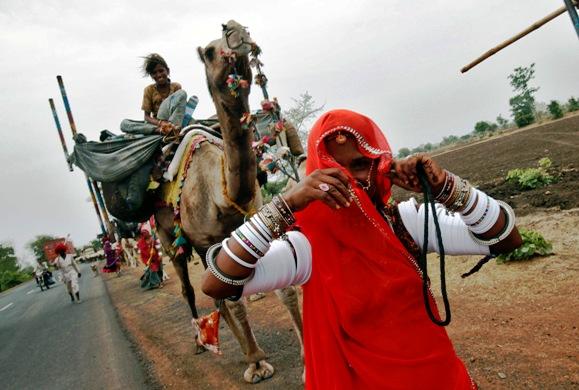'We cannot leave our entire unorganised sector to the vagaries of market forces.'

The Ashok Gehlot government in Rajasthan passed a historic piece of legislation this week providing social security to gig workers.
It came on the heels of another legislation -- Rajasthan Minimum Guaranteed Income Bill 2023 -- which promises employment guarantee for 125 days every year and a minimum pension of Rs 1000 per month to the elderly, women, widows, and disabled people, with a provision of 15 percent increment every year.
This was the brainchild of Nikhil Dey, founder member of the Mazdoor Kisan Shakti Sangathan and Soochana Avam Rozgar Adhikar Abhiyan.
So what went into these laws, and how will they help poor people?
Syed Firdaus Ashraf/Rediff.com spoke to Nikhil Dey to find out. The first of a two-part interview:
How will the lives of the poor change after the Rajasthan Minimum Guaranteed Income Bill 2023 providing social security comes into effect?
Destitution and starvation will go from Rajasthan state.
The pension amount is Rs 1,000 (per month) even as it keeps going up every year. This will not make you rich but you will have a basic amount and earn other amount as well.
The work you are getting is fallback work. It is 125 days a year of work out of 365 days in rural or urban area.
Most people are under-employed and are not totally unemployed, be it in villages or cities.
This law will have assurance for people to have wages for 125 days which will make them comfortable and then look out for other work in the rest of the year.
This is a comprehensive package of social security. You are getting Rs 2 kilo anaj (grain). You are getting a new packet of food which has 1 kilo oil, sugar, salt and masalas. You are getting 100 units of electricity free. If you are a woman you are getting bus fare at half price.
The central government pension is Rs 200 a month. This is since 2007 which means Rs 7 a day, Just imagine what you can buy with that money.
Now in Rajasthan there is a law that there will be minimum pension of Rs 1,000 per month which will automatically increase by 15 percent a year.
How does it get implemented or how does one register for this?
In Rajasthan there are 80 lakh (8 million) households who are active job card holders of MGNREGS (the Mahatma Gandhi National Rural Employment Guarantee Scheme). Every year in Rajasthan Rs 10,000 crore (Rs 100 billion) is spent on NREGA. Now those who complete 100 days in NREGA will get additional 25 days of work.
We do have an Urban Employment Guarantee Scheme in Rajasthan, but now we are making a law. So according to this law if you do not get work when demanded, then in 15 days you are entitled to unemployment allowance. This puts a burden on the state government to provide you with work.
Does the state government have work for so many people, and that too for 125 days in a year?
Workers have 100 days work from NREGA and extra 25 days out of 125 days are not bound by NREGA norms.
There are other kinds of work that the state government can do in those 25 days.
Let us elaborate. For instance, every state institution like schools, aanganwadis or public health centres needs extra hands.
Now say if they go to public health centres, then these workers can do cleaning or caring work in community health centres. In Rajasthan these workers will get Rs 260 per day.
The advantage here is if unskilled workers join a contractor, then the contractor is happy to get free labour and after 125 days of training that labour becomes a skilled labour.
If you put three plumbers or three electricians in such job, then how much skill they will learn, and these jobs are in demand all the time in cities.
It was in February 2023 that NREGA workers were agitating as several states had large unpaid dues. In this scenario, how will this new law help workers in Rajasthan?
This because the central government did not put the money and when you do not put money (into bank accounts) nothing works.
They have said they will pay money and even in West Bengal where the state and Centre are fighting, the Centre says that paisa toh dena hai. In Rajasthan they will fund through the budgetary allocation for this scheme.
How come in today's age there can be a guaranteed income or for that matter guaranteed social security pension? Can any state government deliver on such promises?
There is a difference. This is guaranteed income against work.
In NREGA we have been doing so for the last 15 years. Payment may be late, but by law they get paid.
If you didn't have NREGA, you would have guaranteed (more) deaths during Covid.
There is a cost to the economy, but NREGA made a huge difference to very poorly functional places of economies.
There is a multiplier effect in the market. Money is injected in the market.
There are productive assets that have been built.
Jean Dreze (economist) did a study in Jharkhand of NREGA workers (external link) where fallow land mango cultivation was done and the productivity was incredible. The returns were much more than what would have given any industrialists money.
If that is the reason, why has the government reduced the budget of MGNERGA from Rs 1.11 lakh crore in 2020-2-21 to Rs 60,000 crore in 2022-2023?
It is because the government wants to put money in projects like Bullet Train and Vande Bharat. Their priorities are different and if you want to build six more airports you will not have money for other things.
We also need to look at the cost of this development model. Both are development and to not understand that the infrastructure development in a village or a road or a check dam or tree plantation is also capex (capital expenditure).
We only think of capex as massive highways.
Here we are doing work for development and not cash.
In Madhya Pradesh, the state government is giving straight cash and no work.
Karnataka is giving straight cash in the Gruha Lakshmi scheme to women.
Rajasthan is saying you work and get wages. If you don't work you will not get wages. And pension is a part of your work.
If I am working till 60 and I am not entitled to pension, what will I do?
We cannot leave our entire unorganised sector to the vagaries of market forces.










 © 2025
© 2025